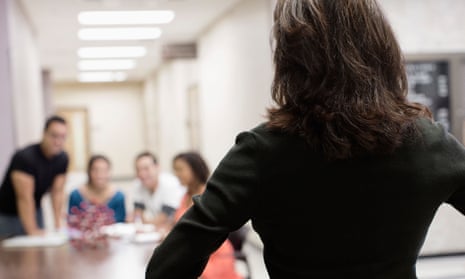Female teachers are not being protected against “upskirting” videos and other forms of online sexual harassment by pupils, the leader of one of the UK’s main teaching unions has said, calling for schools and governments to take the issue more seriously.
Chris Keates, the general secretary of the NASUWT, said her organisation had found multiple instances of women being subjected to upskirting by pupils in secondary schools, including by some as young as 11, and cases where teachers’ faces had been digitally Photoshopped on to pornographic images.
Keates said schools needed to recognise the seriousness of the issue, and reiterated calls for pupils’ use of mobile phones to be banned in classrooms to curb the problems they cause.
“It is a particularly vile form of objectification of women,” Keates said of upskirting, describing how the NASUWT had conducted a long legal struggle to prosecute a case involving its members.
The case involving two women teachers at Portora Royal school in Enniskillen in Northern Ireland – which counts Oscar Wilde, Samuel Beckett and Nigel Dodds MP among its former pupils – began when police discovered a memory stick with the upskirting images and videos taken in 2015 and 2016.
But the police prosecution service refused to charge the pupil responsible and it was only after a judicial review supported by the NASUWT that the former pupil was found guilty of five counts of outraging public decency in February this year.
Keates told delegates at the NASUWT’s annual conference in Belfast that the school – which had merged to become Enniskillen Royal Grammar school – reacted poorly, imposing only a temporary suspension on the pupil and later making him a prefect.
“Our members, with our support, challenged this but at every stage faced the trauma they had suffered being exacerbated by the resistance of the school and the governors who were prioritising the pupil’s rights over those of the teachers,” Keates said. “Our members could not even talk to colleagues about what had happened as they were prohibited by child protection procedures and so, of course, rumours abounded.”
Keates said the laws against abusive images needed to be unified across the UK, with Northern Ireland offering little legal protection and new anti-upskirting laws that came into force in England and Wales this month being inadequate because they did not tackle wider issues of image abuse.
“We get a lot of image abuse that’s not just upskirting, but for example we’ve had members who have actually become quite seriously ill or who have left the profession, because they’ve had their photograph pasted on pornographic images that have been distributed,” Keates said.
Teaching is the leading profession for graduate women in the UK, with many in the sector having to deal with the issue of online sexual harassment.
“[What] we find when we’re dealing with this, is the number of times that members come to us and say either they’ve reported it and nothing has happened, or they haven’t reported it because nothing will happen if I do report it, and so that must mean that schools are not taking it seriously,” Keates said.
“From our point of view, we think those schools that have got systems in place, that take the mobile phones off pupils when they come into school, is the best way to go because it is the health and safety protection of everybody – pupils and teachers.”
Keates paid tribute to the “strength and courage” of the two women who persevered with the Northern Ireland case.
“Their experience shows the continuing difficulty of victims of sexual harassment to have the issue taken seriously and the impact of such actions on health, wellbeing, work and family life understood,” she said.
“Their experiences underlined the misconceptions that unless you are physically touched then you cannot deem to be assaulted. Upskirting is a serious sexual assault.”
